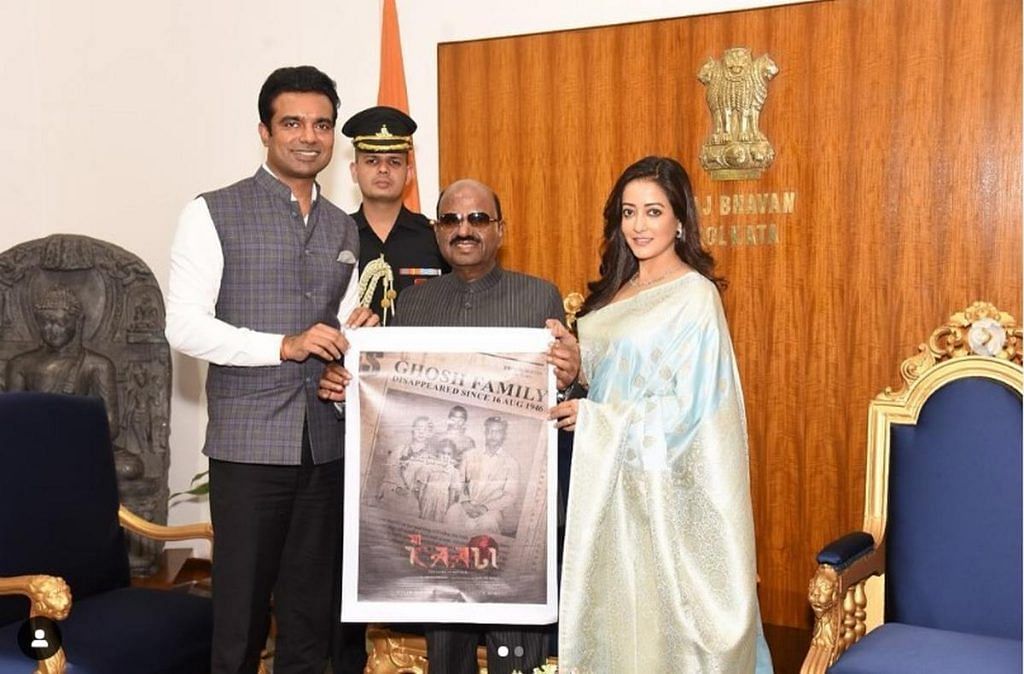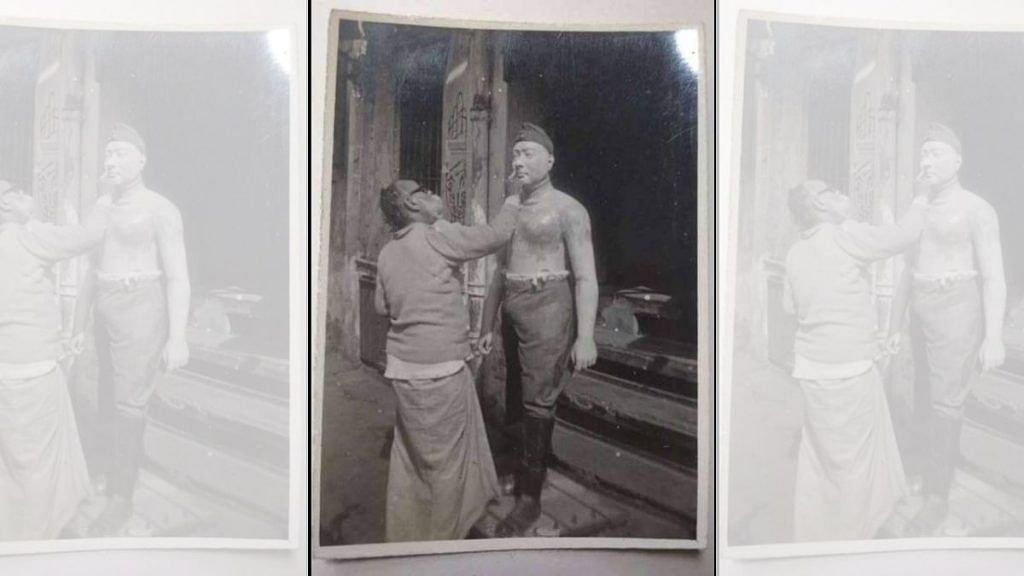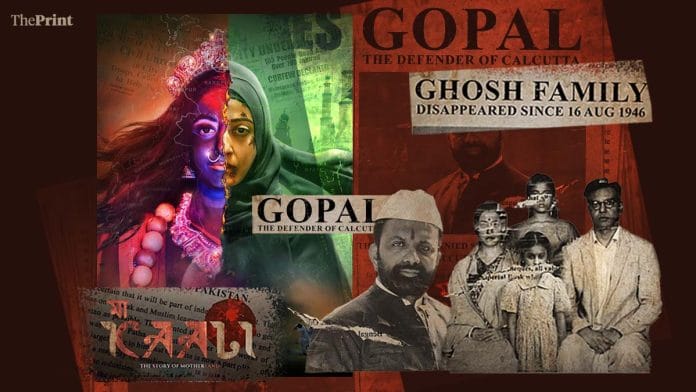Kolkata: The newsprint is yellowing, the photo of a family faded, but the letters scream big, black, and bold: Ghosh family, disappeared since 16 August 1946. Peer closer, and a few more words swim into focus: “orgy of murder, loot, and arson”, “nearly 6,000 persons killed”.
This isn’t archival material, but one of the promotional posters of the upcoming Hindi film Maa Kaali: The Story of Motherland. The film stars Bengali actress Raima Sen as Aparajitha Ghosh, a fictional mother and wife caught in the horrific communal violence that erupted in Calcutta on 16 August 1946. Also known as the ‘Great Calcutta Killings’, the riots raged for several days and killed thousands of people across communities. Ignited by the Muslim League’s call for “Direct Action Day” to demand a separate Muslim homeland, this bloody chapter has once again emerged as a source of division and conflict.
Directed by Vijay Yelakanti, the film claims to lay bare the “erased history of West Bengal”, but it is also catching flak as yet another right-wing ‘propaganda’ film that’s exploiting a painful past to polarise people, especially ahead of the 2024 Lok Sabha elections.
While Maa Kaali is expected to hit screens later this year, its promotional material is already making waves, especially in Bengal. And Raima Sen says that much of the backlash is directed at her, limited not just to online vitriol but “threatening calls”.
Speaking to ThePrint, Sen said her landline phone simply won’t stop ringing and every time she or a family member picks it up, there’s someone on the other end asking her rudely why she is part of a film on the Great Calcutta Killings.
“Before things get out of hand, I simply want to tell those harassing me to watch the film before they pass judgement. The events of August 1946 need to be shown on the big screen,” said Sen, whose last major outing was in Vivek Agnihotri’s The Vaccine War (2023), which was also criticised for promoting a political agenda.

Maa Kaali follows the Ghosh family as they “navigate the hardships and tragedies of history against the backdrop of communal violence and political turmoil,” according to director Yelakanti. While the Ghoshes are fictional, he said his research unearthed numerous real-life families who suffered similar hardships during the August 1946 riots.
The filmmaker, whose last directorial venture was the psychological thriller W/O Ram (2018), maintains that the effects of the riots nearly 80 years ago continue to ricochet in Bengal.
“The cycle of violence never really stopped in Bengal,” said Yelakanti. “Right through 1946, the Partition of 1947, up to the 1971 War of Independence when East Pakistan became Bangladesh, Hindu families were torn apart in an unending cycle of communal hate and violence. Someone needed to tell that story.”
Also Read: Raktabeej & Pradhan to Bonbibi—are films playing political opposition in Bengal?
History, propaganda, movies
Based on its promotions, Maa Kaali appears to clearly pick a side of the ideological fence. Besides the Ghosh family ‘clipping’, another poster represents Gopal Patha, a contentious figure from 1946. Seen by some as a Hindu resistance fighter and by others as a murderous rogue, the poster labels him “Defender of Calcutta”. In smaller print, it states: “The man who denied (Bengal prime minister) Suhrawardy’s dream of turning Calcutta into Pakistan.”
But Raima Sen insists that it’s unfair to call Maa Kaali a propaganda film based just on posters.
“Watch the film. Maa Kaali is about Bengalis who suffered before, during, and even after Partition,” she said. As a Bengali, I wanted to do this film, to show the world the events of August 1946 and their aftermath. This was by far the most challenging role I have played.”
Over the last few years, several films “based on true events” have been labelled propaganda pieces by a section of critics—from The Kashmir Files and The Kerala Story to Article 370 and, most recently, Swatantra Veer Savarkar. These projects are seen as favouring the Narendra Modi government and casting Indian Muslims in a poor light by presenting selective truths from history.
But Sen says Maa Kaali seeks to only portray “a very important part” of Bengal’s history.
“I cannot comment on other movies. Nor do I want to comment on those who brand films this way, because propaganda is a very subjective term,” she said.
Santanu Mukherjee, Gopal Patha’s grandson, told ThePrint he has seen Maa Kaali’s poster and is cautiously optimistic about how his grandfather’s character would be shown in the film.
“In 2018, a Bengali-language film called Danga the Riot, directed by Milan Bhowmik, featured a character inspired by my grandfather. The film was a flop. They tried to introduce a love angle to a story on communal violence and it didn’t work at all,” Mukherjee said.
Mukherjee is also wary of any portrayal that shows Gopal Patha as a bigot.

“My grandfather was not a Muslim hater. Yes, he picked up arms to save Hindu lives. But he made a clear distinction between a Muslim rioter and a Muslim man or woman who had nothing to do with communal violence,” he said.
Mukherjee underscored that in such politically charged times, any misrepresentation would damage not only Patha’s legacy, but social harmony. “My grandfather’s battle cry, ‘If you kill one Hindu, we will kill 10 Muslims’, was only a warning to rioters who were going around the city killing, maiming, and raping,” he said. “I hope the makers of Maa Kaali have studied him properly.”
Also Read: BJP has a ‘non-Bengali’ image problem. Pawan Singh’s nomination makes it worse
Controversy sells?
When it comes to cinema, controversy can be a double-edged sword. It can create hurdles but also generate buzz, said film critic Sharmi Adhikary.
“I do not want to comment on Maa Kaali as the film has not been released yet. But movie makers often gain from such branding,” she said. “If the purpose of some critics is to tell viewers not to go for certain kinds of movies, then often the exact opposite happens. Interests are piqued and people go to see if a different narrative of historical events rather than the known ones has been established.”
Adhikary said as cynical as it sounds, filmmakers often try to leverage negative publicity, including the travails of cast members, in their favour. “But I hope the harassment stops for Raima Sen,” she added.
Sen’s role in Maa Kaali is quite different from other parts she has essayed recently. “In a recent series called Kalanka in the Bengali OTT platform Hoichoi, Raima Sen played a modern wife who seemingly does not have an issue with open marriages. She played the character convincingly,” said Adhikary. “How she plays a female character who shows strength under duress and reminds people of the goddess Kaali remains to be seen.”
About her character, Sen said she has never played a woman who has many shades as Maa Kaali’s Aparajitha. “This is the most challenging role of my career,” she said. “I have no interest in getting into politics, nor am I politically affiliated. I was drawn to the story and the role I play in the film. Beyond history, it is the story of one family and bonds that persist.”
(Edited by Asavari Singh)






